June 26, 2025 | 10:43 GMT +7
June 26, 2025 | 10:43 GMT +7
Hotline: 0913.378.918
June 26, 2025 | 10:43 GMT +7
Hotline: 0913.378.918
At a conference at the end of August 2021, agricultural statistics in the Mekong Delta had concerned many people.
Despite occupying a particularly important position in the economic and social development of the country, the Mekong Delta is facing great impacts and challenges of climate change, the risk of food insecurity, pollution and the risk of soil and water contamination...
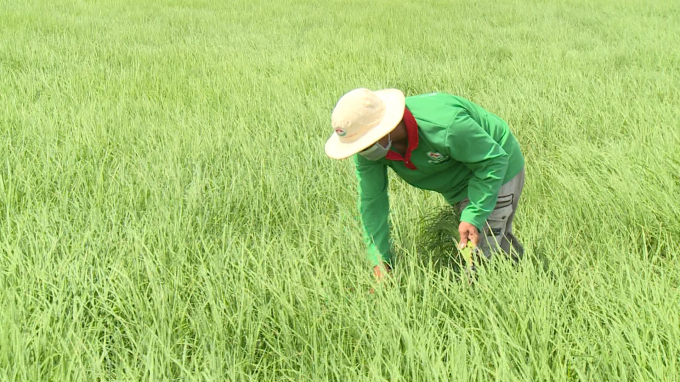
Agricultural production in the Mekong Delta still faces many problems. Photo: Hoang Anh.
These problems reduce the competitiveness of agricultural products in domestic and international markets.
"Along with the resonance between state management agencies and the business community, cooperatives, responsible farmers' associations will form an ecosystem for sustainable agricultural development", Minister Le Minh Hoan.
Specifically, statistics show that the number of fertilizer products circulating in the Mekong Delta provinces accounts for 21.5% (with 4,273 inorganic fertilizer products and 992 organic fertilizer products); the number of trademarked pesticides accounted for 31.24% of the whole country. The average amount of fertilizer used is 1,071 kg/ha planted, 42% higher than the national average; The average amount of pesticides used is 6.27 kg/ha planted, 39.46% higher than the national average...
Faced with such situation, Minister of Agriculture and Rural Development Le Minh Hoan said that it is necessary to have high awareness and immediate action to transform the Mekong Delta's agriculture with the image of Vietnamese agriculture in the direction of transparency, responsibility, sustainability. That is also the principle of the global food system that Vietnam has joined.
To achieve that, it must be open and transparent; with responsibility to both farmers and consumers; with responsibility to the social community; so that agricultural activities, fertilizers and pesticides use will not affect the ecosystem, biodiversity, so that we can still preserve it for future generation.
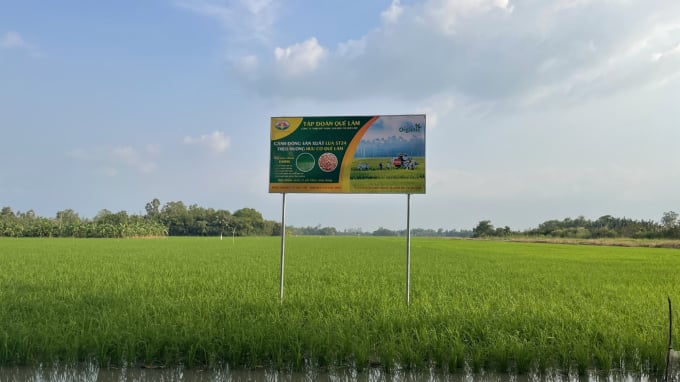
Organic farming models implemented by Que Lam Group are proving highly effective in the Mekong Delta. Photo: Hoang Anh.
According to the Minister, it is necessary to establish an ecosystem or an alliance of businesses that are responsible for agriculture, responsible for farmers and the national brand of agricultural products. These alliances together with state management agencies can plan long-term development strategies, so that good models that have actually been implemented and deployed will help farmers understand that innovation is necessary.. This path can be difficult at first, but in reality, the implemented models have proven effective.
With aspiration to accompany localities and farmers in the Mekong Delta to produce organic agriculture, over the years, Que Lam Group has linked and supported the implementation of pilot models in Long An, Soc Trang, Dong Thap… With perseverance, patience and responsibility, organic farming models are spreading more strongly.
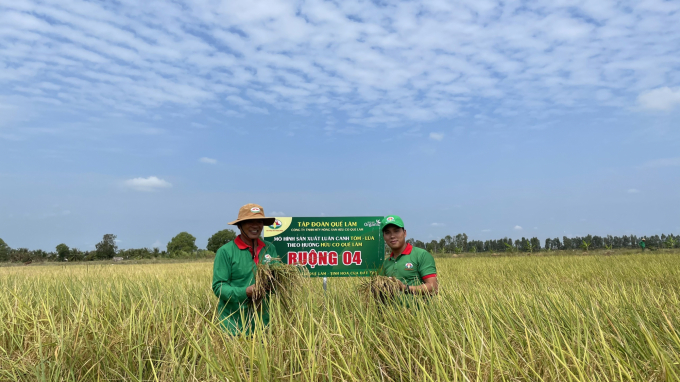
Model of organic production of rice - shrimp rotation by Que Lam Group in the Mekong Delta. Photo: Hoang Anh.
In Dong Thap, after the signing ceremony of organic agricultural production cooperation between Dong Thap Provincial People's Committee and Que Lam Group, recently, the model of right-oriented rice production in An Long commune, Tam Nong district was summarized.
From the summer-autumn crop of 2021, the organic rice production model has been deployed at Phu Tho Agricultural Cooperative with an area of nearly 5 hectares, OM 5451 rice cultivation, this year the area expanded to nearly 21 hectares. Tam Nong District Department of Agriculture and Rural Development also used the process and fertilizer by Que Lam Group to implement a 50-hectare model, with 41 participating households.
This model has proven to be effective, environmentally friendly and safe for the health of producers. Using Que Lam Group microbial organic fertilizer in the process of model farming with beneficial microorganisms will enter the soil to activate, decompose stubble, decompose fertilizer residues and bad soil layers… helping to improve soil environment, creating a porous soil layer, favorable for beneficial microorganisms to develop.
The model has contributed to changing farmers' perception, gradually shifting from traditional farming practices using chemical fertilizers towards organic farming, contributing to the rice brand name of safety and quality for Dong Thap province.
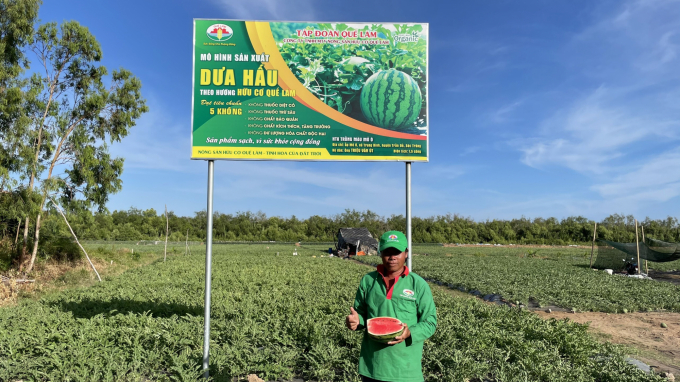
Organic watermelon cultivation in Soc Trang. Photo: Hoang Anh.
In Soc Trang province, since 2018, Que Lam Group has helped to implement 5.2ha of rice farming model, 0.6ha of purple onion and 0.7ha of green-skinned pomelo. These models bring positive results in terms of productivity, product quality and increase income for households.
Based on the effective organic fertilizer use models by Que Lam Group, Soc Trang's agricultural sector has replicated and integrated programs and projects to direct farmers to use organic fertilizers and biological products on rice and other crops in key areas of the province. Specifically, there are 29 rice models with an area of nearly 664 hectares, 9 models of purple onions with an area of 116 hectares and 45 new and renovated models of fruit trees with an area of 76 hectares...
In Long An province, for many years, Mr. Nguyen Quoc Trinh from Phu Long commune, Chau Thanh district has cooperated with Que Lam Group to grow organic dragon fruit.
From 400 pillars of purple and pink dragon fruit in 2018, by now, the model has expanded to 2,400 pillars on an area of 3 hectares, with an annual output of about 70 tons. With the Que Lam method of monitoring the technical process, input materials and product consumption with a price higher than the market by 7 - 15%, each dragon fruit crop, after deducting the expenses of Mr. Nguyen Quoc Trinh's family, yields about 1 billion VND. That is the basis for organic agricultural linkage models in Long An to be continuously expanded, Mr. Trinh affirmed.
Mr. Nguyen Thanh Vinh, General Director of Que Lam Group shared: Through association and production cooperation with cooperatives and units in provinces across the country, Que Lam has issued a sealed, safe and high quality organic rice production process; biosafety organic animal husbandry process; signed cooperation agreements with agencies and sectors to supervise and implement "The process of value chain of organic agricultural production and business, clean and sustainable agriculture".
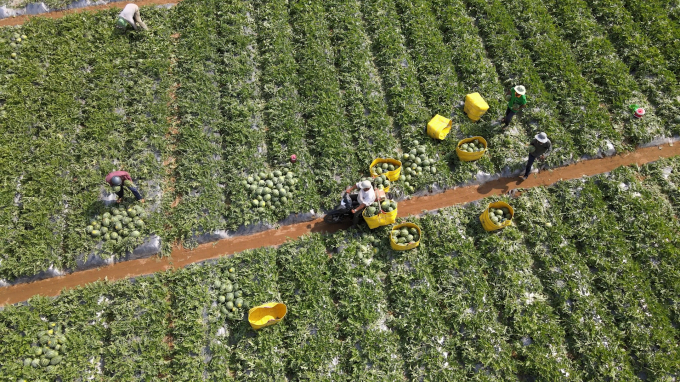
Que Lam Group is making great efforts to spread organic agriculture in the Mekong Delta. Photo: Hoang Anh.
The models have been bringing high economic efficiency and supported by a large number of farmers, leaders of provinces and cities across the country. In particular, many organic agricultural production models have been replicated by the Ministry of Agriculture and Rural Development throughout the country.
These achievements increasingly affirm the core role of Que Lam Group to develop responsible agriculture.
During the visit and working session with the Group at the beginning of the new year 2022, Minister of Agriculture and Rural Development Le Minh Hoan felt that he appreciated the contributions of Que Lam Group, not only their role in leading farmers to organic farming, cycle but also the values they contribute to the community and society. The results of the local linkage models show that the story of Que Lam's journey of kind and responsible farming, especially the journey to restore nutrients back to the soil, is an touching story for all of us.
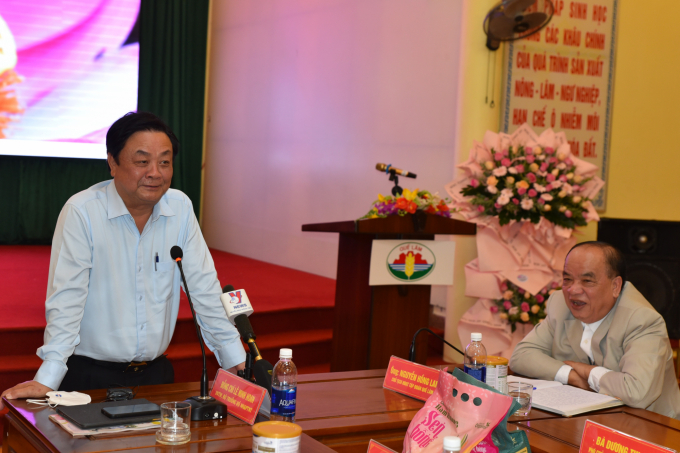
Minister Le Minh Hoan visited and worked with Que Lam Group in early 2022. Photo: Hoang Anh.
The Minister emphasized: The Prime Minister has just approved the Strategy for Sustainable Agriculture and Rural Development to 2030, with a Vision to 2050. This is the first time that Vietnam's agricultural sector has a long-term strategy to guide towards an ecological, transparent and responsible agriculture as we have committed to the international community. There is a need for a stronger mindset change, a stronger spread of organic agriculture, and Que Lam Group is an ecosystem of responsible agriculture.
Through the practical implementation of models and current status of agricultural production in many provinces of the Mekong Delta, Mr. Nguyen Hong Lam, Chairman of Que Lam Group shared: Mekong Delta farmers have a lot of aspiration and potential for organic agricultural production with the motto that cultivation must be associated with livestock to create a circular agricultural economic chain, Que Lam Group affirms that it is always ready to work with localities to shorten the transition to organic agriculture, because only the circular economy can make farmers rich.
Translated by Nguyen Hai Long
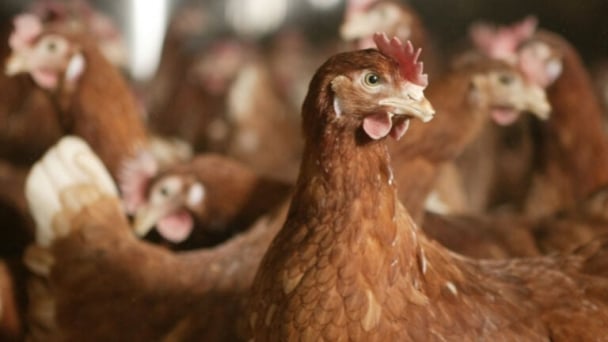
(VAN) Research has shown that Hy-Line brown hens may be better suited for cage-free production based on overall greater egg production and other quality metrics.
![Turning wind and rain into action: [9] Digitizing hydrometeorological data in response to climate change](https://t.ex-cdn.com/nongnghiepmoitruong.vn/608w/files/news/2025/06/17/z6704423696987_15fd32ffc26d590d204d520c9dac6786-nongnghiep-165943.jpg)
(VAN) Farmers have begun accessing hydrometeorological applications to adjust their cropping schedules, aiming to ensure productivity and adapt to climate change.
![Turning wind and rain into action: [8] Real-time salinity detection and early warning technology](https://t.ex-cdn.com/nongnghiepmoitruong.vn/608w/files/news/2025/06/17/z6704423696987_15fd32ffc26d590d204d520c9dac6786-nongnghiep-151127.jpg)
(VAN) Thanks to the integration of modern hydrological-hydraulic models, remote sensing technologies, and artificial intelligence, the accuracy of hydrological forecasting has significantly improved.
![Turning wind and rain into action: [7] Early disaster warnings help marine farmers minimize losses](https://t.ex-cdn.com/nongnghiepmoitruong.vn/608w/files/news/2025/06/17/z6704423696987_15fd32ffc26d590d204d520c9dac6786-nongnghiep-142942.jpg)
(VAN) In recent years, thanks to early disaster warnings and forecasting, marine farmers in Khanh Hoa province have been able to reduce risks and losses, thereby improving production efficiency.
![Turning wind and rain into action: [6] ‘Four on-the-spot’ disaster management software](https://t.ex-cdn.com/nongnghiepmoitruong.vn/608w/files/news/2025/06/17/e5a48259d6a262fc3bb3-nongnghiep-183800.jpg)
(VAN) By simply activating the scenario on the disaster management software, the relevant authorities immediately know how many households need to be evacuated, where to evacuate them to, and by what means of transportation…
![Turning wind and rain into action: [5] Hue applies modern technology in disaster forecasting](https://t.ex-cdn.com/nongnghiepmoitruong.vn/608w/files/news/2025/06/17/z6704423696987_15fd32ffc26d590d204d520c9dac6786-nongnghiep-093938.jpg)
(VAN) In Hue city, modern technology has recently been applied in meteorological and hydrological forecasting and warning, helping to reduce the damage caused by natural disasters.

(VAN) A cutting-edge farming technique being implemented on an experimental ranch in Arizona's Sonoran Desert has already saved a billion gallons of water over five years, according to Civil Eats.